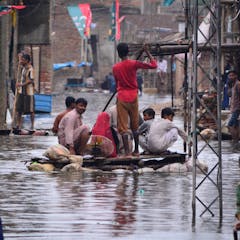
Artikel-artikel mengenai Developing countries
Menampilkan 1 - 20 dari 97 artikel

Charity advertising often reinforces historical stereotypes of underdevelopment that equate Africa with poverty.

More autocratic governments, growing urbanization and emerging technologies will bolster the spread of Chinese influence around the world, an expert on emerging economies explains.

An analysis of past UN conference presidencies suggests the 2023 summit’s agenda would do more to accelerate the transition away from fossil fuels.

Almost two-thirds of low-income countries are at risk of debt distress – in part because of higher borrowing costs. And that isn’t the only problem.

Terms like ‘Third World’ and ‘developing nations’ have long fallen out of fashion.

This week’s summit for a “New Global Financing Pact” will look to secure some much-needed climate cash for developing countries, while ensuring their debt remains manageable.

Despite China’s economic power, the yuan lags as a major global currency. Here’s why current US interest rates and sanctions on Russia may change that.

Older imported cars pose risks to motorists and spew pollution. Some countries, including Ghana, are taking steps to limit the harms of this piece of the vehicle life cycle.

Extreme weather events are complex – and working out exactly how much damage climate change caused is a tricky task.

It’s a crucial time for the World Bank, with growing calls for reform and sky-high expectations of what one leader needs to do. A former World Bank official explains the challenges ahead.

Amid further strain on public funding, we ask: What’s the future of the welfare state in developed and developing nations?

Many developing nations have little cold storage and lose much of their perishable food before it gets to markets. Climate-friendly refrigeration can provide huge environmental and social benefits.

Look for significant progress in 2023 in two key areas, writes a veteran of international climate policy.

Shock results happen, but that doesn’t make it any easier for lower-ranked nations to rise up the ranks, a soccer economist explains.

The historic agreement on a loss and damage fund was overshadowed by lack of progress on phasing out fossil fuels.

It’s a landmark agreement, acknowledging for the first time that wealthy countries bear some responsibility to help. But it leaves many unanswered questions.

The human population has doubled in 48 years, and worsening climate change has left the world facing serious health risks, from infectious diseases to hunger and heat stress.

That’s the big question at the upcoming UN Climate Change Conference, known as COP27, and it’s controversial.

Many small island nations are struggling to protect their land from rising seas while also facing paralyzing debt.

Debt is becoming unaffordable.
